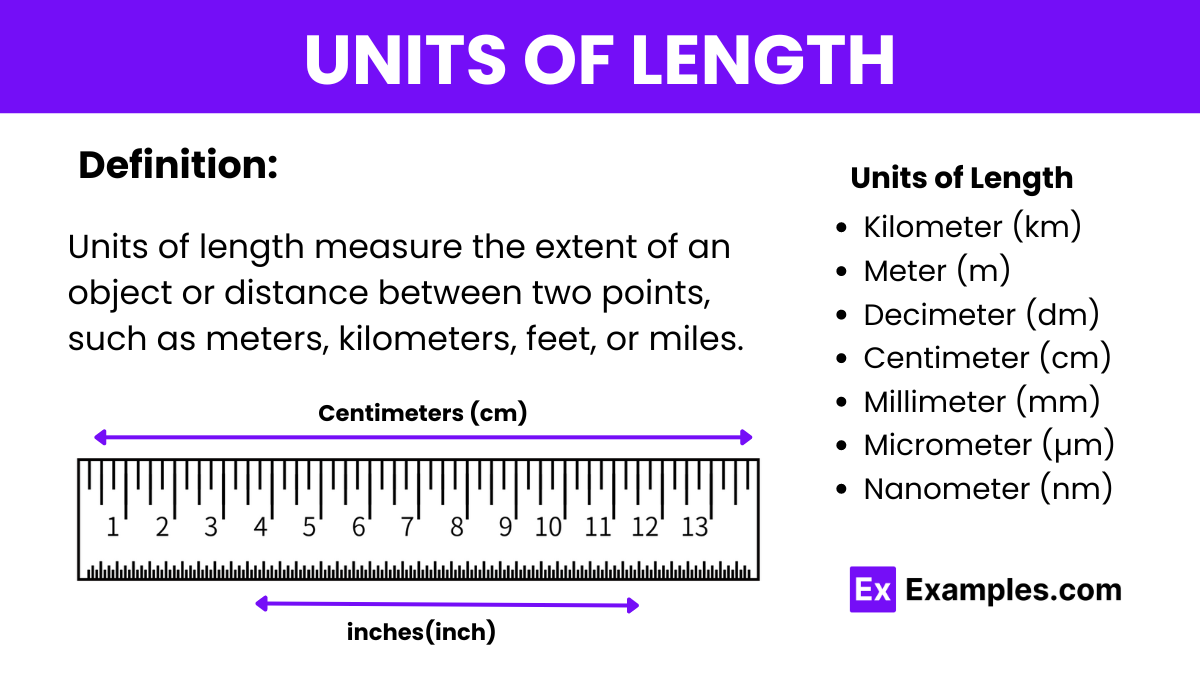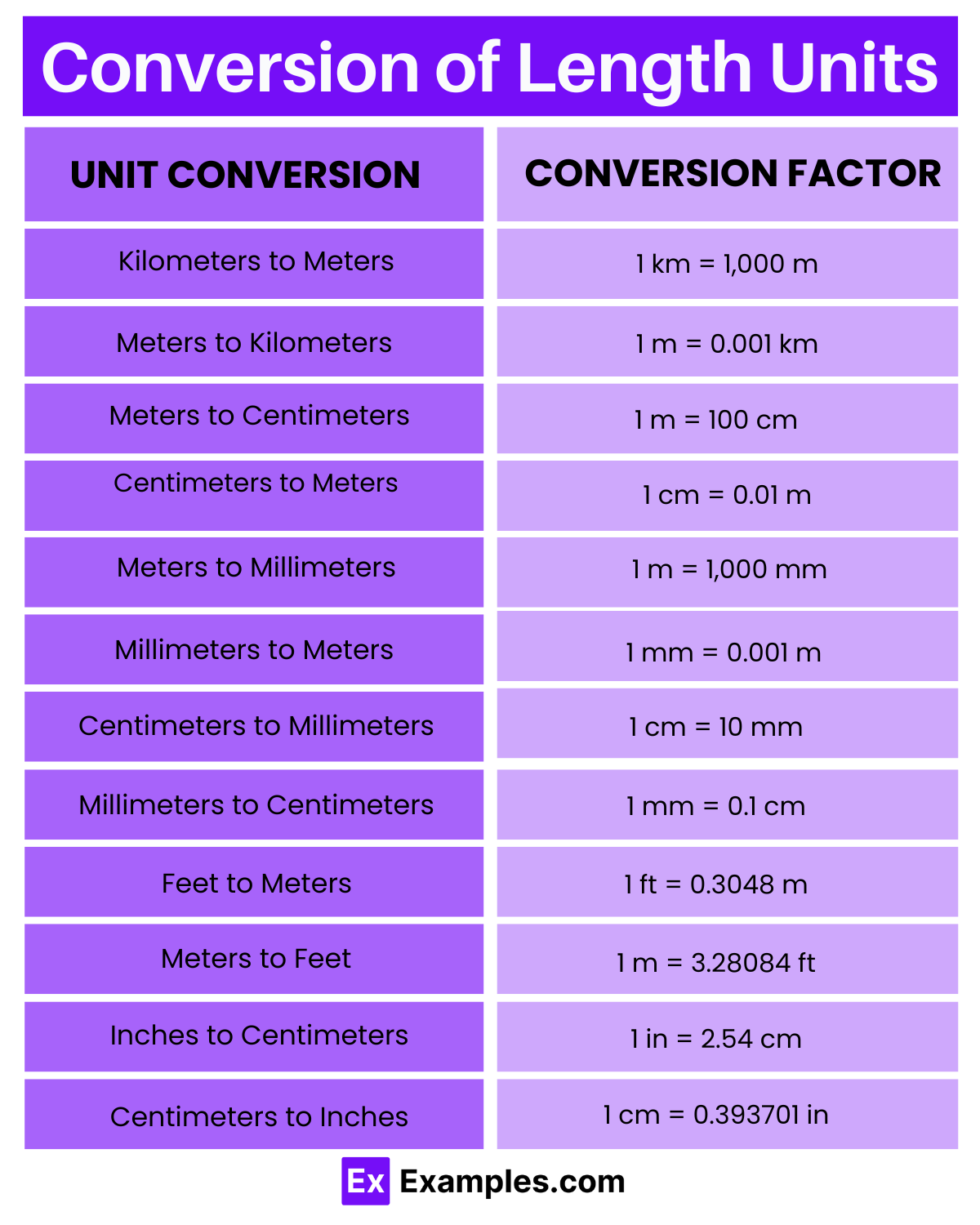What is the SI unit of length?
Meter
Foot
Inch
Yard


The SI unit of length is the meter (symbol: m). It is the fundamental unit of length in the International System of Units (SI), commonly used worldwide. Derived units based on the meter include the kilometer (1,000 meters), centimeter (one-hundredth of a meter), and millimeter (one-thousandth of a meter). These units measure everything from microscopic distances to geographic spans across the globe.
1 kilometer (km) = 1,000 meters (m)
1 meter (m) = 1 meter
1 decimeter (dm) = 0.1 meters (10 decimeters = 1 meter)
1 centimeter (cm) = 0.01 meters (100 centimeters = 1 meter)
1 millimeter (mm) = 0.001 meters (1,000 millimeters = 1 meter)
The primary unit of length in the Centimeter-Gram-Second (CGS) system is the centimeter (cm). The CGS system is a variant of the metric system that is less commonly used today but is still relevant in some scientific contexts, particularly in physics.
1 centimeter (cm) = 1 centimeter
1 millimeter (mm) = 0.1 centimeters (10 millimeters = 1 centimeter)
1 decimeter (dm) = 10 centimeters (1 decimeter = 10 centimeters)
The MKS (Meter-Kilogram-Second) system is a scientific system of measurement that uses the meter as the base unit of length. This system forms the foundation of the International System of Units (SI), which is globally accepted for scientific and commercial use.
| Unit | Relation to Meters | Description |
|---|---|---|
| Kilometer (km) | 1 km = 1,000 m | Used for measuring large distances such as in geography. |
| Meter (m) | 1 m = 1 meter | The base unit of length in the International System of Units (SI). |
| Decimeter (dm) | 1 dm = 0.1 m | Used for smaller, practical measurements not requiring fine precision. |
| Centimeter (cm) | 1 cm = 0.01 m | Common in everyday measurements and school projects. |
| Millimeter (mm) | 1 mm = 0.001 m | Used for fine measurements in fields like engineering and science. |
| Micrometer (µm) | 1 µm = 0.000001 m | Used in scientific contexts to measure tiny objects like cells and bacteria. |
| Nanometer (nm) | 1 nm = 0.000000001 m | Important in physics and chemistry for measuring wavelengths of light and molecular structures. |

| Unit Conversion | Conversion Factor |
|---|---|
| Kilometers to Meters | 1 km = 1,000 m |
| Meters to Kilometers | 1 m = 0.001 km |
| Meters to Centimeters | 1 m = 100 cm |
| Centimeters to Meters | 1 cm = 0.01 m |
| Meters to Millimeters | 1 m = 1,000 mm |
| Millimeters to Meters | 1 mm = 0.001 m |
| Centimeters to Millimeters | 1 cm = 10 mm |
| Millimeters to Centimeters | 1 mm = 0.1 cm |
| Feet to Meters | 1 ft = 0.3048 m |
| Meters to Feet | 1 m = 3.28084 ft |
| Inches to Centimeters | 1 in = 2.54 cm |
| Centimeters to Inches | 1 cm = 0.393701 in |
One kilometer (km) is equivalent to one thousand meters (m). This conversion is commonly used to express distances, especially in contexts involving transportation, geography, and measurement.
One meter (m) is equivalent to 0.001 kilometers (km). This conversion factor simplifies transitioning between meters and kilometers, commonly used in various fields such as science and engineering.
One meter (m) equals 100 centimeters (cm). This conversion is fundamental for everyday measurements and scientific calculations, providing a convenient transition between meters and centimeters.
One centimeter (cm) is equal to 0.01 meters (m). This conversion is frequently utilized in measurements requiring precision, such as in science, engineering, and everyday tasks.
One meter (m) equals 1000 millimeters (mm). This conversion facilitates measurements requiring high precision, such as in engineering, manufacturing, and scientific research.
One millimeter (mm) is equivalent to 0.001 meters (m). This conversion simplifies transitioning between millimeters and meters, commonly used in scientific experiments, construction, and machining.
One centimeter (cm) equals 10 millimeters (mm). This conversion factor is essential for precise measurements in various applications, including engineering, biology, and architecture.
One millimeter (mm) is equal to 0.1 centimeters (cm). This conversion simplifies measurements in fields such as medicine, manufacturing, and woodworking, where precise dimensions are crucial.
One foot (ft) is approximately equal to 0.3048 meters (m). This conversion is widely used in various fields such as construction, engineering, and aviation for accurate distance measurements.
One meter (m) is approximately equal to 3.28084 feet (ft). This conversion is commonly used in everyday situations such as construction, real estate, and sports, where distances are provide content in this format
One inch (in) equals 2.54 centimeters (cm). This conversion is frequently employed in contexts such as architecture, interior design, and international standards for length measurements.
One centimeter (cm) is approximately equal to 0.393701 inches (in). This conversion is commonly used in various applications, including sewing, crafting, and measurements of small objects.
The meter (m) is the base unit of length in the SI system. It is defined based on the distance light travels in a vacuum in a fraction (1/299,792,458) of a second.
Units smaller than a meter include the centimeter (cm) and millimeter (mm). One centimeter equals 0.01 meters, and one millimeter equals 0.001 meters.
In the United States, the common unit of length is the foot (ft). One foot is legally defined as 0.3048 meters.
The kilometer (km) is the most commonly used larger unit, which equals 1,000 meters. It is typically used to measure distances between geographical locations.
Text prompt
Add Tone
10 Examples of Public speaking
20 Examples of Gas lighting
What is the SI unit of length?
Meter
Foot
Inch
Yard
How many centimeters are in a meter?
10
100
1000
10000
What is the unit of length in the metric system that is equal to 0.001 meters?
Millimeter
Centimeter
Decimeter
Micrometer
Which unit of length is commonly used in the United States for measuring shorter distances?
Meter
Kilometer
Foot
Yard
How many inches are in a foot?
10
12
14
16
What is the approximate length of a mile in kilometers?
0.62 km
1.2 km
1.6 km
2.0 km
How many millimeters are there in a centimeter?
1
10
100
1000
Which unit of length is equivalent to 1/1000th of a meter
Micrometer
Millimeter
Nanometer
Picometer
How many yards are in a mile?
1760
1800
2000
2200
What is the SI unit for measuring very small lengths, such as the size of atoms?
Micrometer
Nanometer
Picometer
Femtometer
Before you leave, take our quick quiz to enhance your learning!

